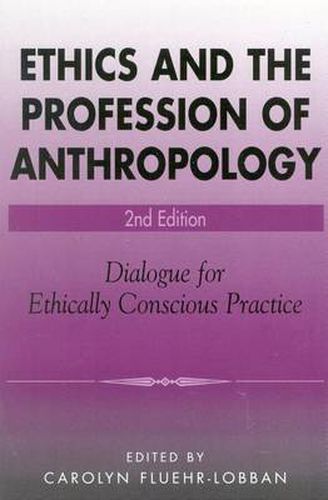Readings Newsletter
Become a Readings Member to make your shopping experience even easier.
Sign in or sign up for free!
You’re not far away from qualifying for FREE standard shipping within Australia
You’ve qualified for FREE standard shipping within Australia
The cart is loading…






This revised second edition of Ethics and the Profession of Anthropology renews the challenge to anthropologists to engage in a dialogue concerning their commitment to professional ethical conduct. Containing over 50% new material, this edition redefines what it means to conduct anthropological research ethically, as the discipline becomes less isolated from allied fields in the physical and behavioural sciences and comes to terms with the global changes that affect its practice. Fluehr-Lobban provides an overview of ethical issues for the past 110 years, as a series of crises involving clandestine research and other questionable actions by anthropologists drew attention to the need for maintaining the ethical core of the discipline and a code of professional responsibility. The contributors describe the impact of secret research and intelligence work by academics, the ethics of medical work among indigenous people, the evolution of cyber-ethics and changes that have occurred within archaeology and museums as a result of the 1990 NAGPRA repatriation legislation and the empowerment of native traditions. The chapters and cases are pedagogical devices useful for classroom discussion, for providing a model for integrating ethics education at all levels of instruction and for engaging the communities studied. It is a valuable tool for contemporary researchers, fieldworkers and instructors, whether they specialize in cultural, physical or linguistic anthropology, or archaeology.
$9.00 standard shipping within Australia
FREE standard shipping within Australia for orders over $100.00
Express & International shipping calculated at checkout
This revised second edition of Ethics and the Profession of Anthropology renews the challenge to anthropologists to engage in a dialogue concerning their commitment to professional ethical conduct. Containing over 50% new material, this edition redefines what it means to conduct anthropological research ethically, as the discipline becomes less isolated from allied fields in the physical and behavioural sciences and comes to terms with the global changes that affect its practice. Fluehr-Lobban provides an overview of ethical issues for the past 110 years, as a series of crises involving clandestine research and other questionable actions by anthropologists drew attention to the need for maintaining the ethical core of the discipline and a code of professional responsibility. The contributors describe the impact of secret research and intelligence work by academics, the ethics of medical work among indigenous people, the evolution of cyber-ethics and changes that have occurred within archaeology and museums as a result of the 1990 NAGPRA repatriation legislation and the empowerment of native traditions. The chapters and cases are pedagogical devices useful for classroom discussion, for providing a model for integrating ethics education at all levels of instruction and for engaging the communities studied. It is a valuable tool for contemporary researchers, fieldworkers and instructors, whether they specialize in cultural, physical or linguistic anthropology, or archaeology.